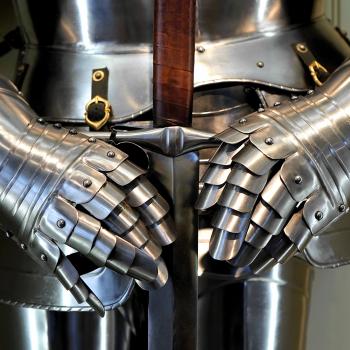To Train Up A Child, chapter 20, part 6
Today we finish reviewing Michael Pearl’s letter to his sons. “Lastly, as your children develop, let them feel a part of the struggles of life,” Michael wrote in the last section. “Life without struggle has no achievement. If they lose their shoes, let them go without until they can make the money to buy more.” This section starts with more of the same.
Make sure you do not have available all the good things to eat. Let them learn to be content doing without. Keep the sugar and junk food out of the house. If they never have it, they will not want it. If eating between meals prevents them from eating the real food (meat, potatoes, vegetables, salads, etc.), then don’t let them eat except at meal time.
“If they never have it, they will not want it” is the biggest bullshit I have ever heard. Growing up, my mother shopped in bulk and cooked from scratch. She was an excellent cook, not having access to a lot of junk foods didn’t mean we didn’t want those things. If we went to someone’s house and they had koolaid, you better believe we were drinking it! It felt like riches. Oh—and I have trouble eating oatmeal to this day, because I ate it every morning for breakfast growing up.
I’m all for teaching children healthy eating habits. “If they never have it, they will not want it,” however, is false.
Also. There is a difference between doing without processed foods and junk that kids don’t need, and doing without food needed for basic survival, or for healthy living. Michael mentions meat, potatoes, vegetables, and salads, which makes it seem like he intends kids to get a basic healthy diet, but it’d be nice if he said that straight out rather than stating “make sure you do not have available all the good things to eat.” (Does good things mean healthy things, or junk food? Clarification would be great.)
It’s also worth noting that Michael once wrote that he and his family have been “down to our last potato many times” due to his bad financial management (i.e. because he values investing in wild schemes which he calls “fun at every step of the way” more than he values properly feeding his children). Knowing that makes me especially question his statement to “make sure you do not have available all the good things to eat.”
Moving on:
Now, there are some flavors or textures that we just have an aversion for. Allow each child one or two dislikes, just don’t let their preferences be too limited. If a child doesn’t like what is on the table, let him do without until the next meal. A little fasting is good training. If you get a child who is particularly finicky and only eats a limited diet, then feed him mainly what he doesn’t like until he likes it.
That first bit and that last bit seem rather in contrast. Let kids have a few dislikes—but if they have too many, feed them all the things they don’t like on purpose and make them eat it. Cool! (In case it’s not clear, that was sarcasm.) Also, I’m really not on board with the comment about fasting being “good training.” Being hungry with no ability to fix that is a horrible feeling.
My approach to “if a child doesn’t like what is on the table” has been to stock a jar of granola bars and tell my kids that if they don’t want to eat what I’m serving, they can have a granola bar. I’m not a fan of forcing children to eat food they don’t like—when, as adults, are we ever forced to eat food we did not pick out, or indeed any food at all? There’s a difference between encouraging a child to try things, or to eat a vegetable that they may not like but doesn’t make them gag, and, well, serving a child only foods they dislike until hunger forces them to eat it anyway.
I’d like to give Michael credit for allowing for some food aversions, but his endorsement of fasting as good for a child and his suggestion that parents feed a picky eater a diet of only food he hates has me chewing my knuckles.
Next, Michael turns to toys.
Forget about buying them toys. Some functional toys are desirable, like a metal truck for the little boys, or a tricycle or bicycle for the older ones. Little girls can profit from play dishes and baby dolls (which resemble real babies). Just don’t cultivate their covetous inclinations by teaching them to expect to have their lusts indulged.
Holy gender essentialism, Batman!
I absolutely agree that many children today end up with far more toys than they need or can effectively use—but that isn’t a reason to march directly to the other extreme. “Forget about buying them toys,” he says, fullstop. Sure, he allows for a very few “functional” toys, but he also writes of kids’ desire for toys as “lusts” that parents should not “indulge.” Um. No? You can buy your kids toys without giving them everything they ever lay their eyes on. I promise.
Growing up, my parents had a lot of kids to spread their money over. They got us things for Christmas and for our birthdays. They were not glitzy or expensive things, but they made those events special. One year my sister wanted a dollhouse, and there wasn’t the money for it. So my mother put together a “kit” with cardboard boxes, tape, decoratively colored paper (for wallpaper), cloth (for carpets), and all manner of other things. My sister loved it.
Now, Michael might caution that he’s not saying parents shouldn’t do things like that. But with his talk of kids not expecting “to have their lusts indulged,” that’s not at all clear. Does he think parents should find ways to make their children’s birthdays and Christmas special by at least making them things (one year my mother made all of our dolls new doll clothes out of scrap cloth)? Or is giving children things to be frowned on in general, as “teaching them to expect to have their lusts indulged”?
This entire section is plagued by lack of specifics.
Michael mixes just enough truth—much of America does have a problem with too much consumerism, including too many plastic toys that end up doing nothing more than collecting under beds—into what he says to sound reasonable to many readers. So yes—I’ll state it outright. It is important to model productive consumerism and teach our children to make decisions, save money, defer purchases, and understand that the point of advertising is to make you want something.
It’s the extremes I’m taking issue with here.
I’d be interested in hearing, in the comments, how other parents have navigated these waters. For myself, I have settled on a formula where we buy the kids toys only at Christmas and their birthdays, and carefully choose things we think they will actually use. Supplementing that, the kids each get an allowance that is generous enough to allow them to reasonably save up for things they want in between—and we guide them through managing their money and making those financial decisions.
By the way, the baby dolls “which resemble real babies” comment is a prohibition on barbies. You know, in case you weren’t up on the minutia of fundamentalist pop culture concerns. Barbies are a no go. They’re too sexualized. Which is humorous because feminists also often have problems with barbies—their unrealistic proportions being one objection—but there we are.
Never yield to the fads. Christians should have too much dignity to be carried along by the Madison Avenue promoters. Their shoes, clothes and cereal should be chosen for serviceability, not style.
When I was a girl, beanie babies were all the rage. I did have a small allowance at the time, and since beanie babies were not that expensive, I was able to afford about one per month—maybe two if I did some extra chores. I loved those things. They became my make believe pets and friends. I still have a few of them to this day—specific ones with memories. Letting children participate in American toy culture—even in toy fads—is not some uniform evil to be avoided.
Also can I just say that the day my mom bought me “jellies,” when I was about five, was one of the happiest days of my life, and I will treasure it as a precious memory forever. Take that Michael.
Hollywood is not for God’s children. Don’t allow the brainless, subversive Sesame Street type propaganda to come into your house. Your children’s thinking should be molded by the word of God and Christian example, not by sex perverts and socialists. If you want to destroy your family then get yourself a good TV and VCR to keep the kids company.
Um. Ok.
I didn’t grow up with a TV—well, we had a TV and a VCR, but our TV didn’t get any channels. And I don’t feel like I missed anything but not watching whatever kid shows were on at the time. What my mom would do, though, is check out movies from the library—Mr. Rogers Neighborhood, or the Magic School Bus, or Veggie Tales, later—and we’d watch those. Sometimes we’d watch movies too, usually older movies like Roman Holiday or White Christmas. I thought that worked fine.
There is a lot of ’90s pop culture that I missed out on. That’s not entirely a bad thing, but it does mean that I don’t have some of the same formational experiences many of my friends have. There’s no quicker way to buy my silence than to start talking about the music and pop stars “we” grew up with in the ’90s. Having had exposure to at least some movies and ’90s children’s programming makes me feel a little less like an outsider vis a vis my peer group than I would otherwise.
I’m not sure what else to say here, because Michael’s rhetoric is so dramatically over the top. Again we find ourselves in the world of extremes. It’s not “be careful what your kids watch” or “teach your kids responsible TV viewership.” It’s throw that damn thing out, it will destroy your family.
Michael finishes his letter with this:
The Christian family is a mother and father with children, all living, laughing, loving, working, playing, struggling, and achieving together for the glory of God.
You must have a vision bigger than the here and now. You are not preparing your child for time, but for eternity. Adam begat a son in his own likeness. You will beget sons and daughters in your image. All earthly pursuits should be with an eye to heaven. That which is first is earthly, carnal, temporal. That which is last is heavenly, spiritual, eternal. As your child bears the image of the earthly, he must bear the image of the heavenly. Born in your image, he must be born-again into Christ’s image. To be conformed to the image of God’s son is our expectation and hope. It is a colossal ambition, but we have the resources of heaven at our disposal.
Wisdom is given upon request. Love is the only commandment, self our greatest enemy, the Bible our only educational resource, the Holy Spirit our comforter, the blood of Christ our only hope. Let us run the race that is set before us ‘for as much as you know that your labor in the Lord is not in vain (1 Cor. 15:58).”
Oh jolly good, Eve gets disappeared. Super nice and all. Actually, there was a scientific theory once that the seed of a child came entirely from the man, and the woman was merely a vessel, a thing that seed grew in.
I suppose we should appreciate that Michael next includes a letter from his wife, Debi, to their daughters, rather than leaving it at this since women are, after all, merely receptacles.















